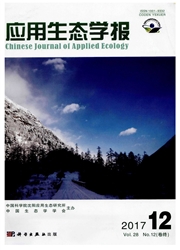

 中文摘要:
中文摘要:
随着城市化发展和城市人居环境的恶化,城市生态风险越来越受到关注,但尚缺乏有关城市生态风险评价的深入系统研究.本文依据城市生态学原理及生态风险评价框架从驱动力、风险源、风险受体与评价终点,以及生态风险综合评价方法等方面对城市生态风险评价研究进行综述.指出城市经济社会活动类型与程度是城市生态风险产生的主要驱动力;城市生态系统不同等级功能实体和城市整体是城市生态风险评价中的风险受体;城市生态风险评价终点包括城市生态系统结构、过程、功能要素,以及城市整体水平的性质和功能变化;耦合了社会经济需求的生态系统模型是城市生态风险评价方法的发展方向.未来城市生态风险评价研究应明确生态风险管理具体目标,确定综合性评价终点,建立多指标评价体系和综合评价方法.
 英文摘要:
英文摘要:
With the development of urbanization and the degradation of urban living environment, urban ecological risks caused by urbanization have attracted more and more attentions. Based on urban ecology principles and ecological risk assessment frameworks, contents of urban ecological risk assessment were reviewed in terms of driven forces, risk resources, risk receptors, endpoints and integrated approaches for risk assessment. It was suggested that types and degrees of urban economical and social activities were the driven forces for urban ecological risks. Ecological functional components at different levels in urban ecosystems as well as the urban system as a whole were the risk receptors. Assessment endpoints involved in changes of urban ecological structures, processes, functional components and the integrity of characteristic and function. Social-ecological models should be the major approaches for urban ecological risk assessment. Trends for urban ecological risk assessment study should focus on setting a definite protection target and criteria corresponding to assessment endpoints, establishing a multiple-parameter assessment system and integrative assess- ment approaches.
 同期刊论文项目
同期刊论文项目
 同项目期刊论文
同项目期刊论文
 Soil warming effect on net ecosystem exchange of carbon dioxide during the transition from winter ca
Soil warming effect on net ecosystem exchange of carbon dioxide during the transition from winter ca Particulate matter deposited on leaf of five evergreen species in Beijing, China: Source identificat
Particulate matter deposited on leaf of five evergreen species in Beijing, China: Source identificat Quality and seasonal variation of rainwater harvested from concrete, asphalt, ceramic tile and green
Quality and seasonal variation of rainwater harvested from concrete, asphalt, ceramic tile and green Profile and distribution characteristics of culturable airborne fungi in residential homes with chil
Profile and distribution characteristics of culturable airborne fungi in residential homes with chil Polycyclic aromatic hydrocarbons in urban soils of Beijing: Status, sources, distribution and potent
Polycyclic aromatic hydrocarbons in urban soils of Beijing: Status, sources, distribution and potent Relationship between land surface temperature and spatial pattern of greenspace: What are the effect
Relationship between land surface temperature and spatial pattern of greenspace: What are the effect The temporal changes in road stormwater runoff quality and the implications to first flush control i
The temporal changes in road stormwater runoff quality and the implications to first flush control i Sampling adequacy estimation for plant species composition by accumulation curves-A case study of ur
Sampling adequacy estimation for plant species composition by accumulation curves-A case study of ur Characteristic and Concentration Distribution of Culturable Airborne Bacteria in Residential Environ
Characteristic and Concentration Distribution of Culturable Airborne Bacteria in Residential Environ Identification of heavy metal pollutants using multivariate analysis and effects of land uses on the
Identification of heavy metal pollutants using multivariate analysis and effects of land uses on the 期刊信息
期刊信息
